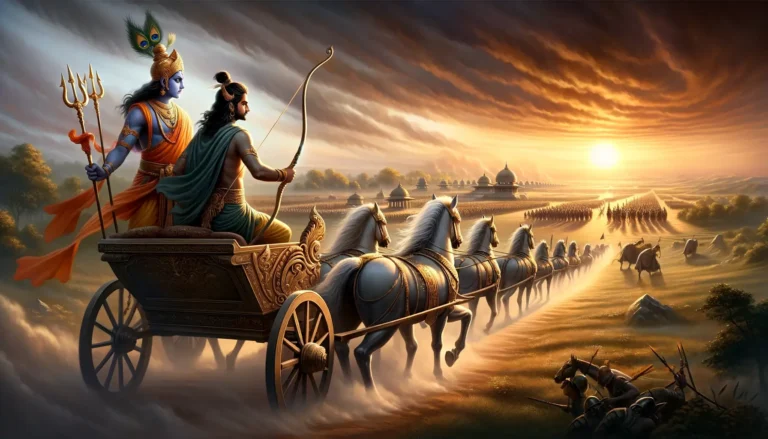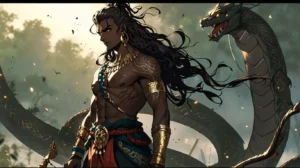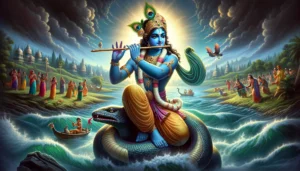In the vast tapestry of Indian mythology and literature, one figure stands out as the epitome of skill, valor, and moral dilemmas—Arjuna, the peerless archer and stalwart of righteousness. His journey through the epic is a saga of triumphs and tribulations, marked by his unwavering commitment to duty, his struggle with ethical quandaries, and his ultimate quest for spiritual enlightenment. In this comprehensive exploration, we delve into the life, character, and significance of Arjuna within the context of the Mahabharata, uncovering the layers of his persona and the timeless lessons he imparts.
Early Life and Lineage
Arjuna, the third son of King Pandu and Queen Kunti, was born through divine intervention, blessed by Lord Indra, the king of gods. Raised alongside his brothers—Yudhishthira, Bhima, Nakula, and Sahadeva—Arjuna received rigorous training in the martial arts and weaponry under the tutelage of Dronacharya, the preeminent warrior guru of his time. Hailing from the illustrious Kuru lineage, Arjuna embodied the noble virtues of his ancestors, combining martial prowess with intellectual acumen and spiritual insight.
Quote: “O Partha, you were born with divine qualities. You are a brilliant archer and a noble soul.” – Lord Krishna to Arjuna (Bhagavad Gita)
This quote from Lord Krishna highlights Arjuna’s divine origins and his inherent greatness, acknowledging his exemplary qualities as a warrior and as a noble-hearted individual.
Characteristics and Attributes
Arjuna’s character is multifaceted, encompassing the qualities of a skilled warrior, a loyal friend, and a seeker of truth. Renowned for his exceptional archery skills, Arjuna wielded the Gandiva bow with unmatched precision and grace, earning him the epithet “Partha” or “the son of Pritha (Kunti).” Beyond his prowess on the battlefield, Arjuna was characterized by his integrity, humility, and devotion to dharma (righteousness). His unwavering commitment to duty, even in the face of moral dilemmas, set him apart as a paragon of virtue amidst the chaos of the Kurukshetra War.
Quote: “Victory or defeat, pleasure or pain – these things are transient. Fulfill your duty, for that is everlasting.” – Bhagavad Gita 2.38
This verse from the Bhagavad Gita emphasizes the importance of duty and righteousness, urging individuals to focus on their responsibilities rather than being swayed by temporary outcomes or emotions.
Triumphs and Trials
Arjuna’s journey in the Mahabharata is replete with triumphs and trials that test his resolve and character. From his triumph in the archery contest at Draupadi’s svayamvara (marriage ceremony) to his pivotal role in the Kurukshetra War, Arjuna’s feats on the battlefield are legendary. However, amidst his martial glory, Arjuna faces numerous moral dilemmas, most notably his reluctance to fight against his own kin and revered teachers on the opposing side of the war. This inner conflict culminates in the existential crisis he experiences on the battlefield of Kurukshetra, where he seeks guidance from Lord Krishna.
Quote: “Perform your duty, Arjuna, without attachment to the fruits of your actions. Renounce selfish desires and surrender to the divine will.” – Bhagavad Gita 2.47
Lord Krishna’s counsel to Arjuna emphasizes the principle of karma yoga, advocating for the performance of one’s duties without attachment to the results, and surrendering to the higher divine will.
The Bhagavad Gita
One of the most profound and enduring episodes in the Mahabharata is the dialogue between Arjuna and Lord Krishna on the battlefield of Kurukshetra, known as the Bhagavad Gita. In this sacred conversation, Arjuna seeks counsel from Krishna regarding his moral dilemma and his reluctance to engage in battle. Krishna, assuming the role of Arjuna’s charioteer and divine guide, imparts timeless wisdom on duty, righteousness, and the nature of existence, offering Arjuna clarity and resolve in the face of adversity.
Quote: “Arise, O Arjuna, and conquer your foes. Stand firm in battle and perform your duty without hesitation.” – Bhagavad Gita 2.3
This verse from the Bhagavad Gita underscores the importance of courage and determination in fulfilling one’s duty, urging Arjuna to overcome his doubts and fears to fulfill his divine purpose on the battlefield.
Legacy and Impact
Arjuna’s legacy transcends the confines of the Mahabharata, leaving an indelible mark on Indian culture and spirituality. His unwavering commitment to duty, his willingness to confront moral dilemmas, and his quest for self-realization continue to inspire generations of readers and seekers. The Bhagavad Gita, encapsulating the wisdom imparted to Arjuna by Lord Krishna, serves as a timeless guide for navigating the complexities of life and fulfilling one’s responsibilities with grace and integrity.
Quote: “Yield not to unmanliness, O son of Pritha! It does not become you. Shake off this base faint-heartedness and arise, O scorcher of enemies!” – Bhagavad Gita 2.3
In this verse, Lord Krishna exhorts Arjuna to rise above his weaknesses and fears, reminding him of his noble lineage and his inherent strength as a warrior destined for greatness.
Conclusion
As we reflect on Arjuna’s life and teachings, we are reminded of the eternal truths that transcend time and circumstance, guiding us on the path of righteousness and self-realization. Arjuna’s legacy endures as a testament to the enduring power of human resilience, integrity, and the pursuit of truth. His journey serves as a reminder that even the greatest warriors face inner conflicts and doubts, yet through introspection and guidance, they can emerge stronger and wiser. The verses of the Bhagavad Gita resonate across the ages, offering solace and wisdom to all who seek clarity in times of uncertainty.
“Set the heart upon the work, but never on its reward.” – Bhagavad Gita 2.47
“Perform your duty, Arjuna, without attachment to the fruits of your actions. Renounce selfish desires and surrender to the divine will.” – Bhagavad Gita 2.47
Lord Krishna
In the words of Lord Krishna, spoken to Arjuna on the battlefield of Kurukshetra, let us find guidance and inspiration to navigate life’s challenges with courage, wisdom, and unwavering devotion to duty.



[…] Also read :Gandeevidhari Arjuna […]